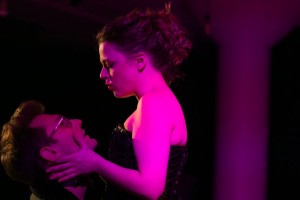 “This isn’t a sex play — it’s not an S&M play — that’s way too simple a frame for how smart it actually is. That’s just the entry point.” – Kate Kataja, director of Venus in Fur, BTC
“This isn’t a sex play — it’s not an S&M play — that’s way too simple a frame for how smart it actually is. That’s just the entry point.” – Kate Kataja, director of Venus in Fur, BTC
Playwright David Ives’ tango of sexual tension, Venus in Fur, succeeds on paper precisely because it’s not about sex, per se, but about discovering and rediscovering the stakes again and again. However, it takes a skillful pair to make the dance work and any director who tackles this script needs to have enough sense to stay out of the way and let the story unfold naturally. In the case of the current run at Burbage Theatre Company, both performance and direction more than make the grade. With one weekend left (this run closes Feb 4) and tickets close to sold out, Rhode Island theatergoers will want to make a grab at any remaining seats for what will most likely be one of this season’s more memorable productions, in any category [Ed. Note: The run has been extended to Feb 10].
Burbage artistic director Jeff Church, who also plays Thomas Novachek, a “beleaguered playwright/director” fitfully attempting to cast his stage adaptation of Leopold von Sacher-Masoch’s Venus in Furs, describes Ives’ play as an all-too relevant “tale of toxic masculinity.” After fretting and worrying over a sea of actresses all too wrong for the part he has in his head (the audience enters to see Thomas wading in a pool of headshots and resumes, women literally at his feet), Vanda (Valerie Westgate in an award-worthy performance) who, coincidentally or not, happens to have the same name as the character Thomas is trying to cast, storms in to the cluttered studio (with a clap of thunder, no less) and the game is afoot.
Ives’ script is at once layered and painfully obvious. References to Medea and witches (even the preshow music slips in some Donovan, for good measure) abound and there are enough thunderclaps to make one feel that a bubbling cauldron may not be a poor substitute for the lonely coffee maker in the corner, but, as stated above, this tale lies in the performance. Westgate and Church circle each other literally and verbally, setting up each blow until it is clear that Vanda has upended any notion of Thomas’ ever successfully putting his lurid tale on stage, at least not without him coming to some sort of acceptance of his motivations. Thomas starts the play by bemoaning the lack of “femininity” in today’s actresses, but he is eventually on his knees, and, as he says, “hoisted by his own petard.” What could be a simple rehashing of Lysistrata becomes a masterclass in wile. Westgate embodies Venus, the Bacchae, and in a moment of pure artistry, a German-tinged Aphrodite. Dwelling on Westgate’s performance here is not overindulgent as she turns on a dime so often – brazen and brash one second, erudite and classicistic the next – that it would take several viewings to take it all in. However, this is not a solo performance. Church, whose comfort with Westgate is evident, gives as well as he gets and what could be a performance mired in frustrated petulance becomes a subtle, reluctant giving way as both actor and director switch sides, weaving a tapestry of modern observances and bodice-ripping extravagances. Is it sexy? Yes, but not overtly sexual. Here is, rather, a simmering passion with a bite – exactly what Thomas hoped to achieve with his ill-advised take on the nature of love.
Set design by Andrew Iacovelli is ingenious. A cascade of books, trailing down the walls, forming a chaise lounge here and an abstract column of thought there, as if a college professor’s study had exploded and the volumes had come to roost like birds, free of the confines of the shelf. A nod to Thomas’ over-intellectualism, perhaps, but also a comment on the literary trappings of love and sexuality, confined to terms that deny touch and communication. Vanda’s Poppins-like satchel of wonders provides such an array of costumes and props that I found myself looking for a trapdoor underneath. The lighting, by Jess Winward, is one of the few times in recent memory where a cue becomes its own character. Even the sound, a tad frail in their previous production of The Great Gatsby, has improved as Burbage gets more comfortable in their new Pawtucket location. Venus is a complete production – smart, sexy and well-rounded.
Asked if there is anything she would like audiences to take away from Venus in Fur, director Kate Kataja says, “I think the production is both meta-theatrical and rooted in really relatable human ugliness — specifically when it comes to traditional gender tropes and the way men and women communicate. Or use those tropes to get what they want. Overall, I’d rather people watching take whatever they’re going to get from it. Everyone hears something different, you know?” As is often repeated in this play, ambiguous does not equal ambivalent and while there may be many interpretations to be made here, Venus in Fur is anything but weak-willed. See it if you still can.
Burbage Theatre Company presents Venus in Fur by David Ives, directed by Kate Kataja. 249 Roosevelt Ave, Pawtucket. For tickets, email: info@burbagetheatre.org or call 401-484-0355.